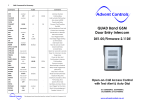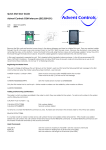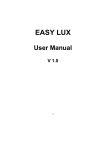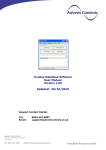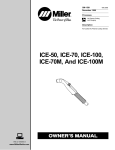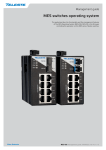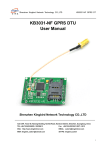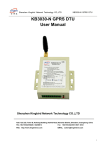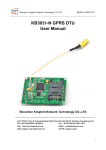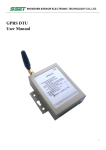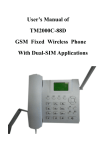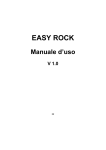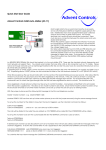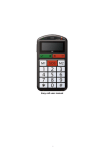Download Roller Shutter Remote Control System User Manual
Transcript
7 SMS Command Set Summary Command Action ADD number . CALL LIST ANY Comments Add User Number NONE CLEARALL CHANNEL # * Alt CLOSE CONNECT NONE CL <seconds> . OP Connect Call Condition Get RSSI Set Call Maximum Time Limit CUSTOM DIAL Call Channel Select Activate CLOSE Relay CSQ CTIME Call Handling Also clears MASTER Custom input message Dial Number on Receipt number LIST List All Numbers MASTER number . MUSER DISABLE ENABLE Add Master User Treat all users as Master OFF Deactivate [default] Relay OFF# Deactivate ‘#’ Relay OFF* Activate [default] Relay ON* Activate ‘∗’ Relay ON# Activate ’#’ Relay ON <seconds> On for <seconds> seconds ON <minutes>m. On for <minutes> minutes OPEN Activate OPEN Relay PRGSIM Purge Inbox PSMS Enable QUERY/QNUM number . ALL NEVER number . PULSE TOGGLE REMOVE Disable Power Up Text Alert Find Number in Memory OPEN Call Handling Remove Number RESET RLYMODE Reset Settings to Defaults RING Relay Mode Toggle/Pulse RLYTIME <seconds> RLYTIME <minutes>m . relay time in minutes RSMS Enable Disable Reset Text Alert (Network) RTIME <seconds> Maximum Ring Time SILENCE <seconds> Maximum Line Silence Time SMS number, SMS OFF (default 3s) interval (days) . TEXTNUM PAYG Keep Alive (switch off KA Text) STATUS TEXTRES Twin B2.05/Firmware 2.11 Deactivate ‘∗’ Relay ON REJECT QUAD Band GSM Twin Relay Board Open-on-Call Twin Output Access Control System for GSM850MHz, GSM900MHz DCS1800MHz & PCS1900MHz Get Relay and Input Status DIS EN number Result Acknowledgement . Text Alert Numbers www.adventcontrols.co.uk Developed and Manufactured by Advent Controls Ltd, Liverpool, UK EMC/EMI Compliance Statement: CE Mark Declaration of Conformance Manufacturer's Disclaimer Statement: The information in this document is subject to change without notice and does not represent a commitment on the part of the vendor. No warranty or representation, either expressed or implied, is made with respect to the quality, accuracy or fitness for any particular purpose of this document. The manufacturer reserves the right to make changes to the content of this document and/or the products associated with it at any time without obligation to notify any person or organisation of such changes. In no event will the manufacturer be liable for direct, indirect, special, incidental or consequential damages arising out of the use or inability to use this product or documentation, even if advised of the possibility of such damages. This document contains materials protected by copyright. All rights are reserved. No part of this manual may be reproduced or transmitted in any form, by any means or for any purpose without expressed written consent of its authors. Product names appearing in this document are mentioned for identification purchases only. All trademarks, product names or brand names appearing in this document are registered property of their respective owners. Contents 1 Introduction 1.2 Technical Specification 1.3 Number Types 2 Operation 2.1 Registration 2.2 Command Message Format 2.3 Master Number Setup 2.4 Allowing Master Control for All Users 2.5 Adding a User Number 2.6 Removing a User Number 2.7 Viewing the Valid Number List 2.8 Finding a Number in the Memory 2.9 Clearing All Numbers and Settings 2.10 Result Acknowledgement Message 3 Relay Operation/Access Control 3.1 Enabling Any Number and Disabling Open-on-Call 3.2 Select the Call Output Relay 3.3 Call Reject 3.4 Connecting a Call 3.5 DTMF Keypad Control 3.6 Relay Status Message 3.7 Relay Activation Mode 3.8 Relay Activation Time 3.9 De-activating Voicemail 3.10 ON & OFF Commands 3.11 OPEN and CLOSE Commands 4 Dialling Commands 4.1 Dial Now 4.4 Changing the Maximum Ring Time 4.5 Changing the Maximum Call Time 4.6 Changing the Maximum Silence Time 5 Setup 5.1 SIM Keep Alive Text 5.2 Signal Strength Indicator 5.3 Power Up/Reset Text Message 6 Installation 6.1 Power Connection 6.2 Output Connection 6.3 Antenna Connection 6.4 Mounting 6.5 Schematic Diagram 7 Command Set Summary 3 3 3 3 4 5 5 6 6 6 6 7 7 7 8 8 8 8 8 8 9 9 9 10 10 11 11 11 11 11 11 12 12 12 12 13 13 13 14 14 15 16 6.5 Schematic Diagram 6.3 Antenna Connection The standard antenna can be used where a good signal exists. In areas with a poor signal an external antenna is recommended connected via RG174 coaxial cable. The system antenna connection is a male Hirose U.FL connector. It is not recommended to use an extension greater than 3m in length. 1. Introduction The Advent Controls GSM B2.05 Relay Board has been primarily designed for security applications although can be used as a general purpose call/SMS activated relay. The twin output allows the for the remote control of roller shutters and garage doors which require separate open and close control. The active whilst ringing and DTMF features allow control of ‘deadman’ inputs where the user must continuously activate the shutter until it is fully open or closed. Both relays can be activated by a call or SMS text from up to 512 stored telephone numbers or can be configured to activate when receiving a call from any number. By default the call will not be answered and hence costs the caller nothing. However, the system can also be set to reject the call if desired or connect a call for DTMF keypad control of the relays. 6.4 Mounting The PCB has been designed to fit into a Hammond 1591B enclosure. When mounting the unit into such an enclosure the enclosure must be modified to allow for the antenna/coaxial cable to be connected. When mounting in a metal cabinet, an external antenna must be used, connected using 50ohm impedance coaxial cable. If required, please contact [email protected] for assistance. Setup and operation is performed by simple SMS text messages including adding and removing user telephone numbers. A complete list of accepted telephone numbers can be viewed via SMS text message. The memory can also be scanned to see if it contains an individual number and the result is displayed by the on-board LED and (if enabled—see 2.10 TEXTRES) by SMS text message. The output relays have both Normally Open (NO) and Normally Closed (NC) with Common (COM) connections. The action of the relay can be a single timed actuation from either 1s to 999s or 1 to 999 minutes or they can be set to toggle between calls. The relays can also be set to remain active whilst the line is ringing making the board suitable for deadman control. Either relay can be set to respond to calls or the system can be set to alternate which relay is activated by a call. 1.2 Technical Specification Power Supply Relay Output SIM Compliant with GSM Phase 2/2+ Antenna 1.3 12-24VDC 500mA Max. (10-15mA idle) 5A Max. CATII 220VAC 1.8/3.6V Class 4 (2W @850/900 MHz) Class 1 (1W @1800/1900 MHz) 50Ω U.FL Number Types When adding a telephone number to the system it can be set up as either a master number or a user number. There is space for 512 numbers and each number can be set up as either type of number. For example you may wish to have 200 masters and 312 users. Both number groups can operate the output relay by SMS text or by calling the board. Master Numbers These numbers are used to make changes to board including adding other numbers. At least one master number must be set up when the board is first used (see section 2.3). Once one master number is set up it can then be used to set up other master numbers Example Master Number setup command: Master 07000000000. User Numbers User numbers are only able to operate the relay output. This can be via SMS text or by calling the board. Unless MUSER is enabled (this makes all numbers master numbers) user numbers cannot access any command functions. RSMS Enable RSMS Disable PSMS Enable PSMS Disable enables the reset text message disables the reset text message enables the power up text message disables the power up text message Example User Number setup command: 6 Installation Add 07000000000. 6.1 Power Connection 2. Operation A fused DC power supply of between 12 and 24VDC should be used with this product. The power connection should be made to the terminals labelled +VE and GND. 2.1 Registration A valid GSM Subscriber Identity Module (SIM) card must be present in the SIM holder for the system to operate. Immediately on power up the system will attempt to register on the SIM card on it’s home network. Once registration has occurred LED1 will change from flashing approximately once every second to a momentary flash once every two seconds. If the LED1 continues to flash once every second for some time, the system cannot register the SIM on the network. The system will restart should this occur. If the problem persists check the antenna and strength of signal in your area/validation of the SIM card. Observe antistatic precautions when inserting the SIM. The second LED, LED2 found by the 5 pin header, is used to display the result of a command. The LED will flash twice to acknowledge the successful receipt of a command and will light continuously for 2s to show the instruction has failed. It also illuminates during any call (valid or invalid) and lights continuously when a signal cannot be found (network dependent). 2.2 Command Message Format To operate the system a master GSM phone is used to send SMS text messages to the system telephone number. All message follow a similar format as follows: Please note if using this equipment in a motor vehicle please consult Advent Controls prior to fitting ([email protected]) 6.2 Output Connection The relay outputs have Normally Open (NO) and Normally Closed (NC) relative to COMmon (COM) connections. These can be actuated in a momentary operation or can be toggled (see 3 Setup). COMMAND<space>action. (eg. Master 07000000000.) The command (see Section 7) is always written first followed by a space and the action required. Although not necessary, it is useful to include a full stop immediately after the action as some mobile phones can enter superfluous characters at the end of a message, which can invalidate the message. The message is not cAsE sensitive. 2.3 Master Number Setup The system is controlled by the master GSM mobile phone numbers (see 2.2 Number Types). The system must first be associated with at least one master phone’s number before it can be used. To do this the supplied 2.54mm jumper connector must be fitted to pins 3 & 4 on HDR1 as shown in red in Figure 1. Do not connect the jumper to any other pins or damage may result. The master phone number must then be sent via a SMS text message to the system phone number as follows: The connections are ‘voltage free’ with no connection to +VE or GND. The relay connections have a minimum creepage distance greater than 4mm and are CATII rated to 220V. MASTER<space>number Both relays share the COMMON terminal. They can be used to operate different pieces of equipment only if the power supply for each piece of equipment is isolated from each other or share a common ground rail. For example, if the master telephone number is 07000 000 000: 5 Setup 5.1 SIM Keep Alive Text MASTER 07000000000. Also valid are the following: When using a Pay As You Go (PAYG) SIM card, to avoid SIM card deactivation, the system can periodically send a SMS text message to keep the SIM active. Ensure the SIM card has sufficient credit to make a call or text (even if the call goes unanswered). To setup the Keep Alive Text function the following SMS text message is sent to the system: SMS<space>number,frequency. enables periodic text message sending e.g. (text 07000000000 every 10 days) disables periodic text message sending SMS 07000000000,10. SMS Off Frequency—number of days interval Master 07000000000 and master 07000000000 The following messages are invalid: master 07000 000 000. (spaces in the number) master07000000000 (no space after ‘master’) The result LED, LED2, will flash two times to indicate the master number has been successfully setup. Calling the board’s telephone number with the master phone will now activate the relay. Once one master number has been setup further masters (up to 512) can be setup by this and subsequent master phones without the jumper fitted (using the same message). Most UK networks require the equivalent spend of one one minute call per quarter. It is recommended a text is sent at least once per month (28 days). 5.2 Signal Strength Indicator When setting up the system it is important to know the strength of signal for reliable operation. To receive a message showing the Received Signal Strength Indicator (RSSI) the CSQ command is sent to the system as follows: CSQ Figure 1. Jumper pins When the system SIM card has sufficient credit a SMS text message is sent to the number which sent the command displaying the current RSSI. e.g. >RSSI 21 The RSSI can be converted to an approximate Signal to Noise Ratio (SNR) in decibels using the following formula: RSSI (dBm) = -113 + 2x(CSQ value) It is recommended that the minimum signal level for the installation is 15 (-83dBm) to ensure reliable operation. The system will operate below –100dBm but may become unresponsive at times. To achieve an improved RSSI the standard antenna can be upgraded to a model with higher gain and/or the antenna should be positioned in an area with less physical obstruction. An extension lead can be attached to the SMA connector on the PCB to locate the antenna away from the control unit housing. 5.3 Power Up/Reset Text Message The system can send an message to all the text numbers when a system reset or power up has occurred. This can be due to network failure or power cycling (power off followed by power on). Note the system repeatedly resets during network outage. You will only receive 1-message after a network outage. For further information please view page 12: http://www.adventcontrols.co.uk/Alpha_v2_04_F2_11.pdf Using the PIN for Master Setup The Master Number can also be set up using the PIN. This is only possible for the first master number that is added to the system. Subsequent masters must be added by a master using the MASTER command. The PIN is the last 5 characters of the IMEI number written on the QUECTEL GSM module sticker. The command is sent as follows: Master 07000000000,37212. for module with IMEI 355073034237212 2.4 Allowing Master Control for all Users To enable any user to control master commands (such as adding and removing numbers) the MUSER command is sent to the board, by a master number, as follows: MUSER ENABLE MUSER DISABLE Allows any valid user number to modify settings Only master numbers can modify settings By default MUSER is set to disable full access for all users. N.B. Only master numbers can add other master numbers despite this setting 2.5 Adding a User Number Any telephone number of at least 5 digits where caller ID is available is valid. The system only compares the last 8 digits (if present) of any calling number against the numbers stored in memory. Therefore it is not necessary to enter the international dialling code format of the telephone number. i.e. for 07000000000 only the characters shown in BOLD text are considered The ADD command is used to add a new telephone number. To add a new number any master phone must send the following SMS text message to the system telephone number: add<space>number. e.g. Add 07000000000. 3.11 OPEN and CLOSE Commands The OPEN ‘star’ relay and CLOSE ‘hash’ relay can be operated by SMS text message using the OPEN and CLOSE commands. When using these commands the system behaves like it has received a call and follows the RLYTIME and RLYMODE (not ‘Ring Mode’) configuration. OPEN CLOSE activates the ‘hash’ relay for RLYTIME# or indefinitely if RLYMODE TOGGLE activates the ‘hash’ relay for RLYTIME* or indefinitely if RLYMODE TOGGLE The opposing relay is always deactivated i.e. when OPEN is sent the CLOSE relay is deactivated. 4 Dialling Commands If TEXTRES is enabled the system will respond with the ‘Operation Successful’ message. 4.1 Dial Now 2.6 If necessary the system can make a call at any time. This is achieved using the DIAL command. The call observes the RTIME, CTIME and SILENCE time settings Removing a User Number The REMOVE command is used to remove an existing telephone number. To remove an existing telephone number any master phone must send the following SMS text message: remove<space>number. e.g. REMOVE 07000000000. If TEXTRES is enabled the system will respond with the ‘Operation Successful’ message. If the number is not found the ‘Operation Failed’ message will be sent by the system. 2.7 Viewing the Valid Number List DIAL<space>number. e.g. make an ad-hoc call to the specified number dial 01517283167. The call will end when the other party hangs up or the CTIME or SILENCE time limit is reached. 4.2 Changing the Maximum Ring Time The system can send a SMS text message containing a complete list of valid user numbers to any master phone. To receive the list of numbers the LIST command is used. The master phone must send the following SMS text message to the system: The maximum time for which the system will attempt dialling is set using the RTIME command. The default time limit is 60s. The RTIME command is specified in seconds and can be set from 1s to 255s. Most calls will require at least 15s for connection which is included in RTIME. List RTIME 45. sets the maximum ring time to 45 seconds No further characters are required and are ignored if received. 4.3 The response format shows the last 8 digits of the stored number followed by a space and the next number and so on…(the master will not appear in the list but will also be valid). The numbers are in the reverse order to the order they were added with the primary master not displayed. Changing the Maximum Call Time The maximum time limit for an answered call is set using the CTIME command. The default time limit is 45s. The CTIME command is specified in seconds and can be set from 1s to 255s. CTIME 45. sets the maximum call time to 45 seconds e.g. 33333333 22222222 11111111 00000000 4.4 2.8 Finding a Number in the Memory When a large number of numbers are stored in the memory using the LIST command can be impractical. To find whether an individual number is stored in the memory the master user sends the following command to the board: Changing the Maximum Line Silence Time The maximum time for which a silent call will remain connected is set using the SILENCE command. This is useful were a call may be redirected to voicemail. The silence during recording will cause the system to hang the call. The default silence time is 15s and can be set from 1s to 255s. SILENCE 25. sets the maximum line silence time to 25 seconds e.g. 3.9 rlytime 10. rlytime# 250s Rlytime* 1m. RLYTIME 960m. 1 second activation time 250 second activation time for ‘hash’ relay 1 minute activation time for ‘star’ relay 16 hour (16 x 60mins) activation time (both relays) De-activating Voicemail In order to fully control the relay action whilst using ‘Ring Mode’ it may be necessary to deactivate the SIM card voicemail call divert. The network command for deactivating voicemail is: ##004# (To deactivate all incoming diverts: ##002# - not recommended) To use the code the code is entered like a telephone number and dialed. If the user is able to put the SIM in a mobile phone then we recommend doing this before it is used in the board. If this is not possible the user may use the DIAL command to send the code to the network. The MASTER user sends the following text to the board: DIAL ##004#. 3.10 The ON command is used to activate the relay with a SMS text message. The OFF command deactivate the relay, whether activated by the ON command or a call. By default the ON command activates the opposite relay to that selected by the CHANNEL command (see Section 3.2). This allows calls to control one relay and texts to control the other. However, either relay can be operated at any time by the ON command by specifying the relay as follows: operates the other relay to that set by the CHANNEL command operates the ‘star’ (CLOSE) relay operates the ‘hash’ (OPEN) relay When the ON command is sent without any additional instructions the relay is activated indefinitely. When sent with a value and m(inutes) or s(econds) parameter the relay activates for a set period of time. The maximum number length is three characters therefore the timer is limited to 999 seconds or 999 minutes. If the m or s parameter is not sent then the timer value is read as the number of seconds. e.g. on ON 10. ON# 250s ON* 1m. ON 960m. activates relay indefinitely 10 second activation time (s parameter optional) activates the ‘hash’ relay for 250 seconds activates the ‘star’ relay for 1 minute 16 hour (16 x 60mins) activation time OFF OFF# deactivates the default relay under all conditions deactivates the ‘hash’ relay or NB the number should be the full number (not the 8-digit truncated number) If the number is present the LED will flash 4 times and if not in the memory the LED will light twice for 2 seconds. If TEXTRES is enabled an SMS text message will be sent with the result. 2.9 Clearing All Numbers and Settings The CLEARALL command is used to erase all stored user and master numbers. To erase all numbers the following SMS text message is sent by a master number: CLEARALL No response is sent by the system to acknowledge the command 2.10 ON & OFF Commands ON ON* ON# QUERY<space>number. QNUM<space>number Result Acknowledgement Message The system can be setup to send a SMS text message to acknowledge a command. This acknowledges the result of the last command processed such as adding a new user number. The SIM card in the system must have sufficient credit for sending SMS text messages. To enable/disable the service the following text message is sent by the master number: TEXTRES enable (or also valid: TEXTRES e) TEXTRES DISABLE (or also valid: TEXTRES d) The result message ‘Operation Successful’ is sent when the service is enabled 3 Relay Operation/Access Control 3.1 Enabling Any Number and Disabling Open-on-Call The system can be setup to allow any number to operate the relay output. To enable any call the CALL command is used with the action ANY and is sent by the master phone in the following format: Call any To return the system to operate from only valid user numbers the LIST action is sent with the CALL command as follows: call list To disable activation of the relay by calling the following command is sent to the board (the relay can still be activated by SMS text; see ON/OFF and OPEN/CLOSE commands): CALL NONE If the system loses power the relay state is restored when the power is reconnected! If TEXTRES is enabled the system will respond with the ‘Operation Successful’ message. 3.2 Select the Call Output Relay Where ‘Open-on-Call’ is enabled (see Section 3.1) an incoming call can be set to actuate either the ‘star’ or ‘hash’ relays or the board can be set to alternate between each relay on every call. Alternating between each relay is useful for controlling an open and close input on a roller shutter or gate controller. One call opens the shutter and the next closes the shutter. To select the ‘star’ relay output channel the following command is sent to the board: CHANNEL * selects the ‘star’ or CLOSE relay output To select the ‘hash’ relay output channel the following command is sent to the board: CHANNEL # selects the ‘hash’ or OPEN relay output To alternate which output a call activates the following command is sent to the board: CHANNEL ALT Similarly the ‘hash’ relay is activated by pressing and holding the ‘#’ key on the keypad. Once finished the user hangs up the line. 3.6 To determine the current status of the output relays the STATUS command is sent to the system telephone number by a master phone as follows: STATUS The system will respond with a SMS text message as follows: STAR-RELAY OPEN GATE-RELAY CLOSED The ‘star-relay’ is the relay operated by the DTMF ‘∗’ key under DTMF control—also known as the CLOSE relay. The ‘#’ is the relay operated by the ‘#’ key under DTMF control—also known as the OPEN relay. alternate between ‘∗’ and ‘#’ on each call 3.7 3.3 Call Reject By default any call to the system will be allowed to ring indefinitely (or up to the host network time limit). This is to avoid calls being diverted to voicemail when rejected by the system. However the system can be instructed to reject (hang up) calls using the REJECT command: REJECT ALL Relay Status Message rejects all valid calls Relay Activation Mode When a valid call is received the relay can be set to activate for a set period of time (set by the RLYTIME command), to activate whilst the caller is ringing or to toggle between states on each call. By default the relay mode is set for timed (pulsed) activation. To switch to toggle mode the following message is sent to the system by the master number: RLYMODE TOG GLE enables toggle mode To activate the relay for however long the caller rings (n.b. turn off voicemail!) The reject command can also be used to determine the status of the relay when in toggle mode by sending the following command: RLYMODE RING REJECT OPEN rejects the call when the call is deactivating the relay To revert to timed (pulsed) mode the following message is sent: REJECT NONE disables all call rejection RLYMODE PULSE 3.4 3.8 Connecting a Call By default, when called the system is set to ring indefinitely (or up to the host network time limit). However the system can be set to connect a call which allows the user to control the output relays using the telephone DTMF keypad. e.g. CONNECT Enable connect disable 3.5 DTMF Keypad Control connect when input high disable call connection A caller may operate the output relays using the DTMF keypad on their telephone. Note most mobile phones will not allow the continuous transmission of DTMF tones and instead will just send a short tone burst. This makes control via mobile phone impossible. To enable DTMF control the call must be answered by the board. This is achieved by sending the CONNECT ENABLE command as described in Section 3.4. The ‘star’ relay is activated by pressing and holding the ‘∗’ key on the telephone keypad. relay active whilst phone rings—’Ring Mode’ relay Normally Open (NO) (time set by RLYTIME—Section 3.8) Relay Activation Time The RLYTIME command is used to adjust the time the relays are active following a call when RLYMODE is set to PULSE (or when using the OPEN and CLOSE commands—see section 3.x). Each relay can have it’s own RLYTIME time set. If the relay is not specified the RLYTIME command set the pulse time for both relays. However if the relay is specified the pulse time for only the specified relay is set. To specify the intended relay the command is modified as follows: RLYTIME# RLYTIME* RLYTIME sets the ‘hash’ relay pulse time sets the ‘star’ relay pulse time sets the pulse time for both relays By default the relay time is set to 3s. The time can be set from 1s to 999 seconds or 1 to 999 minutes using this command. To change the activation time the master number sends a SMS text message as follows: RLYTIME seconds. RLYTIME minutesm.









